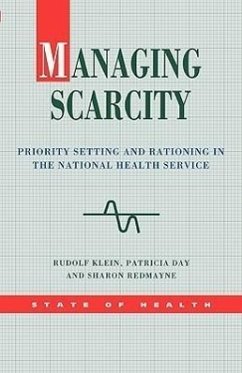The "rationing" of health care has become one of the most emotive issues of the 1990s in the UK, causing much public confusion and political controversy. This book provides a comprehensive and critical introduction to this debate. It does so by examining the processes which determine who gets what in the way of treatment, the decision makers involved at different levels in the NHS and the criteria used in making such decisions. In particular it analyses the relationship between decisions about spending priorities (taken by politicians and managers) and decisions about rationing care for individual patients (taken by doctors), between explicit and implicit rationing. As well as drawing on research-based evidence about what is happening in Britain today, Managing Scarcity also looks at the experience of the NHS since 1948 and puts the case of health care in the wider context of publicly funded services and programmes which have to allocate limited resources according to non-market criteria. Managing Scarcity is recommended reading for students and researchers of health policy, as well as health professionals and policy makers at all levels in the NHS.
Hinweis: Dieser Artikel kann nur an eine deutsche Lieferadresse ausgeliefert werden.
Hinweis: Dieser Artikel kann nur an eine deutsche Lieferadresse ausgeliefert werden.








